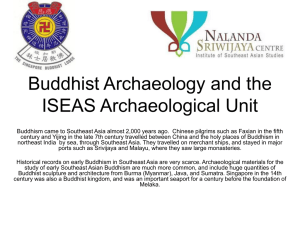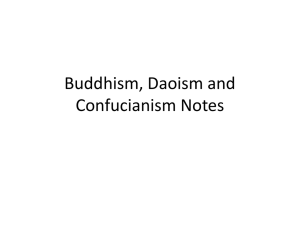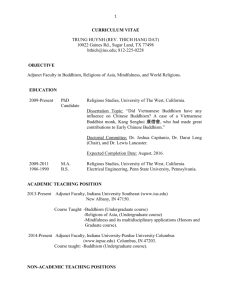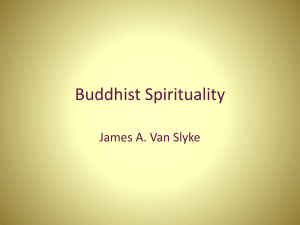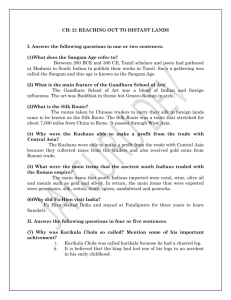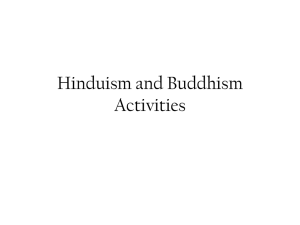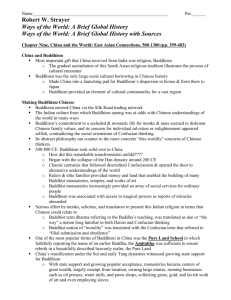Religion 28/ASLC 57
advertisement
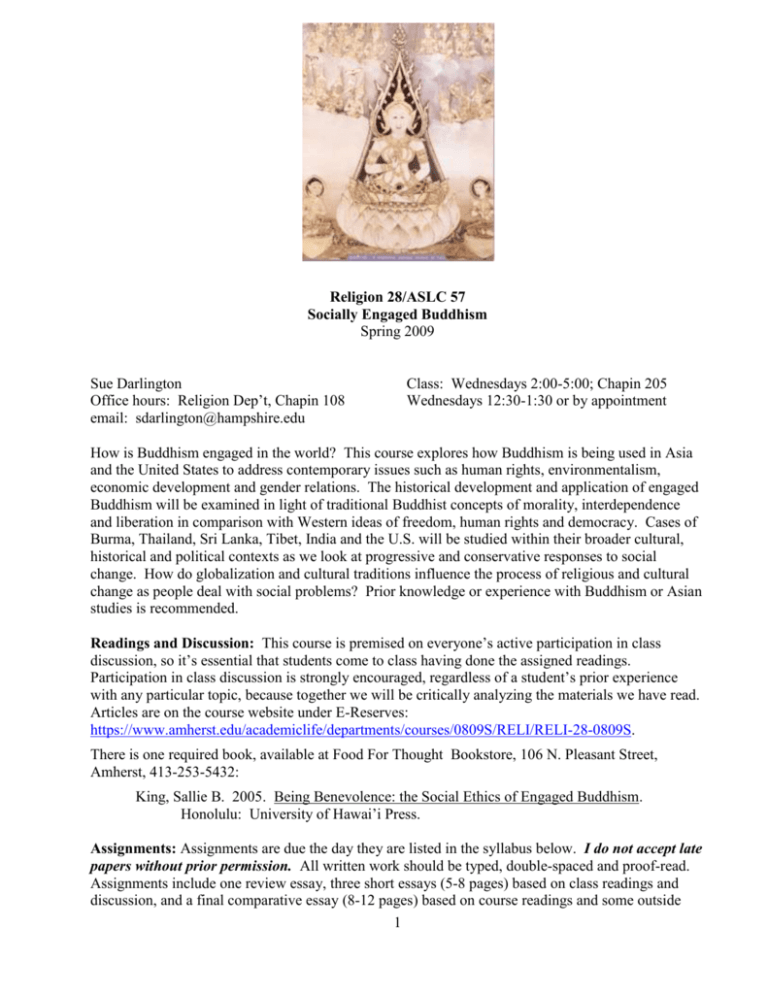
Religion 28/ASLC 57 Socially Engaged Buddhism Spring 2009 Sue Darlington Office hours: Religion Dep’t, Chapin 108 email: sdarlington@hampshire.edu Class: Wednesdays 2:00-5:00; Chapin 205 Wednesdays 12:30-1:30 or by appointment How is Buddhism engaged in the world? This course explores how Buddhism is being used in Asia and the United States to address contemporary issues such as human rights, environmentalism, economic development and gender relations. The historical development and application of engaged Buddhism will be examined in light of traditional Buddhist concepts of morality, interdependence and liberation in comparison with Western ideas of freedom, human rights and democracy. Cases of Burma, Thailand, Sri Lanka, Tibet, India and the U.S. will be studied within their broader cultural, historical and political contexts as we look at progressive and conservative responses to social change. How do globalization and cultural traditions influence the process of religious and cultural change as people deal with social problems? Prior knowledge or experience with Buddhism or Asian studies is recommended. Readings and Discussion: This course is premised on everyone’s active participation in class discussion, so it’s essential that students come to class having done the assigned readings. Participation in class discussion is strongly encouraged, regardless of a student’s prior experience with any particular topic, because together we will be critically analyzing the materials we have read. Articles are on the course website under E-Reserves: https://www.amherst.edu/academiclife/departments/courses/0809S/RELI/RELI-28-0809S. There is one required book, available at Food For Thought Bookstore, 106 N. Pleasant Street, Amherst, 413-253-5432: King, Sallie B. 2005. Being Benevolence: the Social Ethics of Engaged Buddhism. Honolulu: University of Hawai’i Press. Assignments: Assignments are due the day they are listed in the syllabus below. I do not accept late papers without prior permission. All written work should be typed, double-spaced and proof-read. Assignments include one review essay, three short essays (5-8 pages) based on class readings and discussion, and a final comparative essay (8-12 pages) based on course readings and some outside 1 research. All assignments except the final one are due on Fridays. I will accept email submissions provided they are in the following format: They must be saved in Microsoft Word. You must put your last name and assignment title as both the file name and the subject line of your email. If you want to submit a hard copy, you must submit it to my box in Social Science at Hampshire College, Room 218, Franklin Patterson Hall. Review Essay on Origins and Principles Peace & Non-violence Human Rights & Political Buddhism Economic Development & Environmentalism Final Comparative or Case Study Essay February 13 March 6 April 3 April 24 May 13 *Plagiarism: Plagiarism is the presentation of another person’s ideas or words as if they were your own, without acknowledging the source. Plagiarism is a serious offense, and can result in either failure for the course or suspension from the College. As you write your papers, you must be sure to cite your sources thoroughly and correctly, whether you are quoting directly or paraphrasing. Ignorance of plagiarism is not an excuse. If you are ever uncertain as to whether doing something is technically plagiarism, you should ask. You should also consult with writing reference manuals for correct citation and bibliographic formats, including for citing Internet sources. A good guide on Avoiding Plagiarism is on the Amherst website: https://www.amherst.edu/campuslife/deanstudents/acadhonesty/plagiarism Grades: You will be evaluated on both written assignments and class participation. As class meets only once a week, if you miss more than two class meetings without a good reason, you may not get a good grade. Your grade will be reduced for every class missed without a documented reason. You will be evaluated on the development of research, analytical and critical thinking skills. You will also be expected to demonstrate a solid knowledge and understanding of the topics of the course. Remember: Communication with me about your status in the class can help you meet the course goals and do well in this course. Grades will be based on the following: Review essay Each topical essay Final comparative essay Class participation Fudge factor 15% 15% (45% total) 20% 15% 5% (to be applied to the area in which you perform best) 2 Class Schedule & Reading List January 28 Introduction: What is Engaged Buddhism? February 4 Historical Roots of Engaged Buddhism Queen, Christopher S. 1996. “Introduction: The Shapes and Sources of Engaged Buddhism.” In Queen, Christopher S & Sallie B. King, eds., Engaged Buddhism. Albany, NY: SUNY Press. Pp. 1-44. King, Sallie B. 2005. Being Benevolence: the Social Ethics of Engaged Buddhism. Honolulu: University of Hawai’i Press. Chs. 1, “Introduction,” 2, “Building from Tradition,” & 3, “Engaged Buddhist Ethical Theory” (pp. 1-86). o Recommended, especially if you have limited background in Buddhism: Harvey, Peter. 1990. Introduction, Ch. 1, 2 & 3. An Introduction to Buddhism: Teachings, History and Practices. Cambridge: Cambridge University Press. Pp. 1-72. Gethin, Rupert. 1998. “Four Truths: The Disease, the Cause, the Cure, the Medicine.” The Foundation of Buddhism. Oxford: Oxford University Press. Pp. 59-84. Peace and Nonviolence February 11 Nonviolence and the Beginnings of Modern Engaged Buddhism King, Sallie B. Being Benevolence. Ch. 4, “Individual and Society,” & 6, “Nonviolence and Its Limits” (pp. 87-117; 164-201). Thurman, Robert A. F. 1996. “Nagarjuna’s Guidelines for Buddhist Social Action.” In Arnold Kotler, ed. Engaged Buddhist Reader. Berkeley: Parallax Press. Pp. 79-90. Sulak Sivaraksa. 2005. Conflict, Culture, Change: Engaged Buddhism in a Globalizing World. Boston: Wisdom Publications. Chs 1, 2, & 4 (pp. 3-20, 25-33). Friday, February 13: Response essay on Foundations of Engaged Buddhism due by 3 p.m. February 18 Thich Nhat Hanh Hunt-Perry, Patricia and Lyn Fine. 2000. “All Buddhism is Engaged: Thich Nhat Hanh and the Order of Interbeing.” In Christopher S. Queen, ed. Engaged Buddhism in the West. Boston: Wisdom Press. Pp. 35-65. King, Sallie B. 1996. “Thich Nhat Hanh and the Unified Buddhist Church: Nondualism in Action.” In Queen, Christopher S & Sallie B. King, eds., Engaged Buddhism. Albany, NY: SUNY Press. Pp. 321-364. Thomas, Claude. 1996. “Finding Peace after a Lifetime of War.” In Arnold Kotler, ed. Engaged Buddhist Reader. Berkeley: Parallax Press. Pp. 98-103. Thich Nhat Hanh. 1992. “Love in Action.” In Touching Peace. Berkeley: Parallax Press. Pp. 73-79. February 25 Violence and Self-Violence King, Sallie B. 2000. “They Who Burned Themselves for Peace: Quaker and Buddhist SelfImmolators during the Vietnam War.” Buddhist-Christian Studies 20:127-150. Cao Ngoc Phuong. 1988. “Days and Months.” In Eppsteiner, Fred, ed. The Path of Compassion. Berkeley: Parallax Press. Pp. 155-169. 3 [con’t] Thich Nhat Hanh. 1996. Love in Action. “Love in Action.” Pp. 39-48; “Call Me by My True Names.” Pp. 107-112. Tatz, Mark, trans. 1994. The Skill in Means Sutra. Delhi: Motilal Banarsidass Publishers. Pp. 7377. Human Rights and Political Buddhism March 4 Human Rights and Freedom in Buddhism King, Sallie B. Being Benevolence. Ch. 5, “Human Rights.” Pp. 118-163. Mabbett, Ian. 1998. “Buddhism and Freedom.” In Kelly, David & Anthony Reid, eds. Asian Freedoms: The Idea of Freedom in East and Southeast Asia. Cambridge: Cambridge University Press. Pp. 19-36. Soraj Hongladarom. 1998. “Buddhism and Human Rights in the Thoughts of Sulak Sivaraksa and Phra Dhammapidok (Prayudh Prayutto).” In Damien V. Keown, ed. Buddhism and Human Rights. Richmond, Surrey: Curzon Press. Pp. 97-110. Seneviratne, H.L. 2001. “Buddhist Monks and Ethnic Politics: A War Zone in an Island Paradise.” Anthropology Today 17(2):15-21. Ghosh, Amitav & H.L. Seneviratne. 2001. “Buddhist Monks and Ethnic Politics.” Anthropology Today 17(4):24-25. Friday, March 6: Essay on Peace and Nonviolence due by 3 p.m. March 11 The Case of Burma Philp, Janette and David Mercer. 2002. “Politicised Pagodas and Veiled Resistance: Contested Urban Space in Burma.” Urban Studies 39(9):1587–1610. Silverstein, Josef. 1998. “The Idea of Freedom in Burma and the Political Thought of Daw Aung San Suu Kyi.” In Kelly, David & Anthony Reid, eds. Asian Freedoms: The Idea of Freedom in East and Southeast Asia. Cambridge: Cambridge University Press. Pp. 187-204. McCarthy, Stephen. 2004. “The Buddhist Political Rhetoric of Aung San Suu Kyi.” Contemporary Buddhism 5(2):67-81. Aung San Suu Kyi. 1991. Freedom From Fear. NY: Penguin Books. “In Quest of Democracy,” & “Freedom From Fear.” Pp. 167-185. March 18 – Spring Break March 25 The Case of Tibet Powers, John. 1998. “Human Rights and Cultural Values: the Political Values of the Dalai Lama and the People’s Republic of China.” In Damien V. Keown, ed. Buddhism and Human Rights. Richmond, Surrey: Curzon Press. Pp. 175-202. Cabezón, José Ignacio. 1996. “Buddhist Principles in the Tibetan Liberation Movement.” In Christopher S. Queen & Sallie B. King, eds., Engaged Buddhism. Albany, NY: SUNY Press. Pp. 295-320. Kolas, Ashild. 1996. “Tibetan Nationalism: The Politics of Religion.” Journal of Peace Research 33(1):51-66. [con’t] 4 Dalai Lama. 2000. “The True Source of Political Success.” In Stephanie Kaza & Kenneth Kraft, eds. Dharma Rain: Sources of Buddhist Environmentalism. Boston: Shambhala Press. Pp. 165169. Economic Development and Environmentalism April 1 Economic Justice King, Sallie B. Being Benevolence. Ch. 7, “Justice/Reconciliation.” Pp. 202-228. Sulak Sivaraksa. 2002. “Economic Aspects of Social and Environmental Violence from a Buddhist Perspective.” Buddhist-Christian Studies 22:47-60. Prayudh Payutto. 2000. “Buddhist Solutions for the Twenty-first Century.” In Stephanie Kaza & Kenneth Kraft, eds. Dharma Rain: Sources of Buddhist Environmentalism. Boston & London: Shambhala. Pp. 170-177. Sulak Sivaraksa. 2000. “The Religion of Consumerism.” In Stephanie Kaza & Kenneth Kraft, eds. Dharma Rain: Sources of Buddhist Environmentalism. Boston & London: Shambhala. Pp. 178-182. Sulak Sivaraksa. 2000. “Development As If People Mattered.” In Stephanie Kaza & Kenneth Kraft, eds. Dharma Rain: Sources of Buddhist Environmentalism. Boston & London: Shambhala. Pp. 183-190. Friday, April 4: Essay on Human Rights and Political Buddhism due by 3 p.m. April 8 How Environmental is Buddhism? Harris, Ian. 1997. “Buddhism and the Discourse of Environmental Concern: Some Methodological Problems Considered.” In Mary Evelyn Tucker & Duncan Ryuken Williams, eds. Buddhism and Ecology. Cambridge: Harvard University, Center for the Study of World Religions Publications. Pp. 377-402. Harris, Ian. 1991. “How Environmentalist is Buddhism?” Religion 21(April):101-14. Schmithausen, Lambert. 1997. “The Early Buddhist Tradition and Ecological Ethics.” Journal of Buddhist Ethics 4:1-74. Holder, John J. 2007. “A Suffering (But Not Irreparable) Nature: Environmental Ethics from the Perspective of Early Buddhism.” Contemporary Buddhism 8(2):113-130. Swearer, Donald K. 1997. “The Hermeneutics of Buddhist Ecology in Contemporary Thailand: Buddhadasa and Dhammapitaka.” In Mary Evelyn Tucker & Duncan Ryuken Williams, eds. Buddhism and Ecology. Cambridge: Harvard University, Center for the Study of World Religions Publications. Pp. 21-44. April 15 Thai Buddhist Environmentalism Sulak Sivaraksa. 2005. Conflict, Culture, Change: Engaged Buddhism in a Globalizing World. Boston: Wisdom Publications. Ch. 11 (pp. 71-78). Darlington, Susan M. 1998. “The ordination of a tree: The Buddhist ecology movement In Thailand.” Ethnology 37(1):1-15. Darlington, Susan M. 2003. “Buddhism and Development: The Ecology Monks of Thailand.” In Christopher Queen, Charles Prebish, & Damien Keown, eds. Action Dharma: New Studies in Engaged Buddhism. London: RoutledgeCurzon. Pp. 96-109. [con’t] 5 Darlington, Susan M. Forthcoming (2009). “Translating Modernity: Buddhist Response to the Thai Environmental Crisis.” In Abraham Zablocki, Nalini Bhushan, and Jay Garfield, eds. TransBuddhism. Amherst: University of Massachusetts Press. Gender and Race April 22 Does Gender Matter? Gross, Rita M. 2004. “The dharma of gender.” Contemporary Buddhism 5(1):3-12. Keefe, Alice A. 1997. “Visions of Interconnectedness in Engaged Buddhism and Feminist Theology.” Buddhist-Christian Studies 17:61-76. Watson, Gay. 2003. “Buddhism and the Feminine Voice.” Contemporary Buddhism 4(1):25-31. Lindberg Falk, Monique. 2006. “A Silent Undercurrent : The Significance of Nuns’ Socially Engaged Buddhist Practice in Thailand.” In Karma Lekshe Tsomo, ed. Out of the Shadows : Socially Engaged Buddhist Women. Delhi: Sri Satguru. Friday, April 24: Essay on Economic Justice and Environmentalism due by 3 p.m. April 29 The Problem of Nuns Barnes, Nancy J. 1996. “Buddhist Women and the Nuns’ Order in Asia.” In Queen & King, eds. Engaged Buddhism, pp. 259-294. de Silva, Ranjani. 2004. “Reclaiming the Robe: Reviving the Bhikkhuni Order in Sri Lanka.” In Karma Lekshe Tsomo, ed. Buddhist Women and Social Justice: Ideas, Challenges, and Achievements. Albany: State University of New York Press. Pp. 119-135. Ohlson, Caren I. 2004. “Resistance without Borders: An Exploration of Buddhist Nuns across Cultures.” In Karma Lekshe Tsomo, ed. Buddhist Women and Social Justice: Ideas, Challenges, and Achievements. Albany: State University of New York Press. Pp. 233-252. Mrozik, Susanne. 2009. “A Robed Revolution: The Contemporary Buddhist Nun’s Movement” Religion Compass. May 6 Gender and Race, and Conclusions. Smith, Sharon. 2003. “Widening the Circle: Communities of Color and Western Buddhist convert sanghas.” In Christopher Queen, Charles Prebish, & Damien Keown, eds. Action Dharma: New Studies in Engaged Buddhism. London: RoutledgeCurzon. Pp. 220-236. Willis, Jan. 1996. “Buddhism and Race: An African-American Baptist-Buddhist Perspective.” In Marianne Dresser, ed. Buddhist Women on the Edge. Berkeley: North Atlantic Books. Pp. 81-91. Pierce, Lori. 2000. “Diversity as Practice: Thinking about Race and “American” Buddhism.” In Karma Lekshe Tsomo, ed. Innovative Buddhist Women: Swimming Against the Stream. Richmond, Surrey: Curzon. Pp. 277-284. hooks, bell. 1996. “Contemplation and Transformation.” In Marianne Dresser, ed. Buddhist Women on the Edge. Berkeley: North Atlantic Books. Pp. 287-292. King, Sallie B. Being Benevolence. Ch. 8, “Conclusion.” Pp. 229-249. Wednesday, May 13: Comparative or Case Study Paper due by 3 p.m. 6

